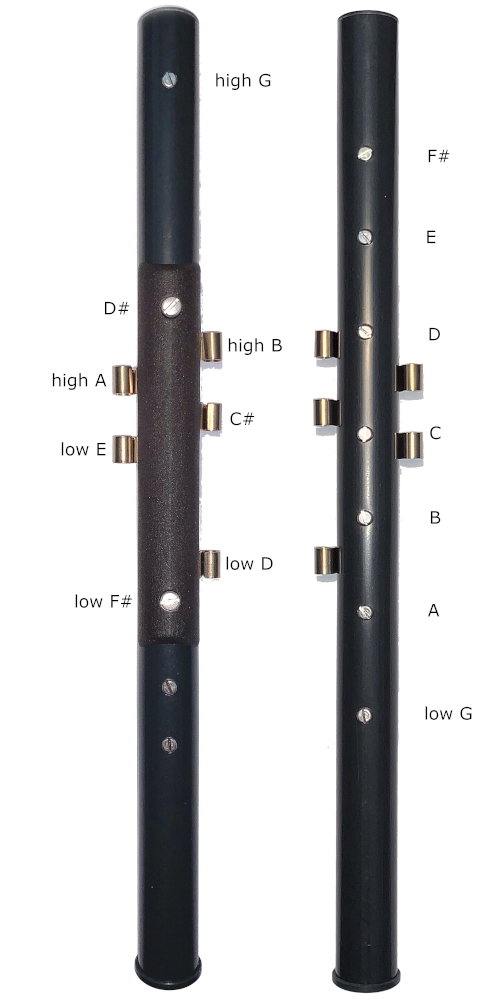7 keyed northumbrian smallpipes
The chanter is available in a 7 keyed Northumbrian Smallpipes (NSP) version. On the NSP version,
the two bottom holes are slightly closer to the other holes.
The chanter is available in black or white.

THE CONTACTS
The contacts on the chanter are electrical and not mechanical, meaning that
they do not have to be pressed down to achieve contact. The grip does not have
to be any firmer than that on the pipe chanter. The contacts are about 3mm in
diameter, and with their highest point slightly above the surface of the pipe in
order to get a better feel for their position. Worth mentioning is that there is
no electrical "ground contact" on which a finger or any other part of the body
has to rest on, or be connected to, whilst playing.
PLAYING
You start the drones by covering all holes, and then the chanter by playing a low G.
If you don't want the drones to sound you just play a low G. If you want to shut the sound
off briefly, just play the "off" fingering combination and it will go silent
until you start playing again.
SETTINGS/CONTROLS
There are two contacts that are used to control all settings. To adjust a
setting, just hold the relevant fingering combination and use the control
contacts.
The following can be controlled:
- Sensitivity: Since the fingers sometimes can be very dry, causing them to
become poor conductors, and sometimes quite sweaty, leaving a sweat film on the
chanter short-circuiting the contacts, the sensitivity is possible to set. Most
of the time though, the setting of the sensitivity can be ignored.
- Pitch: the chanter is tuned to the key of F. The low G goes from
185Hz up to 738Hz in steps of 0.1-0.7Hz, with 349Hz as start pitch. The key can easily be
set to D, F, F#, G, A (440Hz), or Bb.
- Metronome: easy to start in desired tempo. Sub-beats can be added.
- Drones: volume relative to chanter. The drones are always in tune with and follows the key of the chanter. For a chanter with tonic in G, the following drone combinations can be set: gG, gdG, aA, dAD, adD, and eE.
- Scale: low D (key), low E (key), low F# (key), low G, A, B, C, C# (key), D, D# (key), E, F#, high G, high A (key), high B (key).
- Volume: affects chanter, drones, and metronome.
- Sound: Northumbrian smallpipes or Great Highland pipes.
- Recording: more than 1200 notes can be recorded. During playback, the
recorded notes are sounding on the right channel, and you can play along on the
left. The playback speed can be set between ¼ and 2 times the recorded speed.
MIDI
MIDI (Musical Instrument Digital Interface) is an electronic communications
protocol that enables electronic musical instruments, computers, and synthezises etc.
to communicate with each other. MIDI does not transmit an audio signal -
it transmits digital data messages defining parameters such as pitch and
volume of the musical notes to play. See http://www.midi.org for further reading.
You enter MIDI mode by holding a specific fingering combination and then
inserting the MIDI cable plug to switch the chanter on.
The chanter is initially set to channel 1, but can be set between 1 and 14.
The bass is fixed on channel 15 and the tenor fixed on channel 16.
In MIDI mode the metronome and recording are not
available.
The pitch is adjusted in semi-notes.
The volume settings for chanter and drones affect the "velocity" of the MIDI
note. On some devices the velocity is the same as the volume for the note, on
others it isn't. It is up to the receiving device to interpret the velocity
data.
In MIDI mode the power consumption is lower and the chanter will run for
approx. 20 hours on a rechargeable 1000mAh NiMH battery.
DIMENSIONS
The length of the pipe is 249mm and the diameter is 16mm. The dimensions together with
the low weight of approx. 60 grams, make this chanter very portable indeed.
ADDITIONAL INFORMATION
The manual
SOUND SAMPLE

